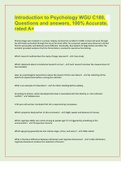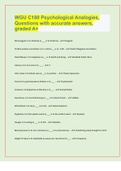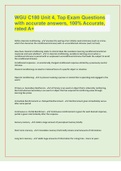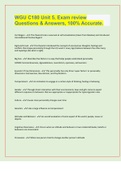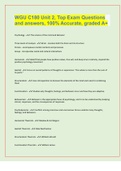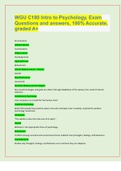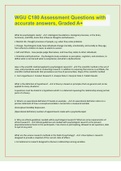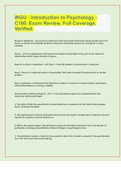WGU- C180
Latest uploads at WGU- C180. Looking for notes at WGU- C180? We have lots of notes, study guides and study notes available for your school.
- 0
- 0
- 0
Majors at WGU- C180
Notes available for the following studies at WGU- C180
Latest notes & summaries WGU- C180
Introduction to Psychology WGU C180, Questions and answers, 100% Accurate, rated A+ Phineas Gage was involved in a serious railway construction accident in 1848. A steel rod went through his left cheek and exited through the top of his head. After he recovered, people who knew him noticed that his personality and behavior were different. Eventually, descriptions of Gage before and after the accident provided evidence that the frontal lobe is involved in executive functioning. Which rese...
WGU C180 Psychological Analogies, Questions with accurate answers, graded A+ Monozygotic is to identical as ___ is to fraternal. - -Dizygotic Perfect positive correlation is to +1.00 as __ is to -1.00. - -Perfect Negative Correlation David Meyers is to happiness as __ is to death and dying. - -Elizabeth Kubler-Ross Latency is to 4 as anal is to ___. - -2 John Locke is to tabula rasa as __ is to g factor. - -Charles Spearman Freud is to psychosexual as Erikson is to ___. - -Ps...
WGU C180 Unit 4, Top Exam Questions with accurate answers, 100% Accurate, rated A+ Define classical conditioning - -Involves the pairing of an initially neutral stimulus (such as a tone, which then becomes the conditioned stimulus) with an unconditioned stimulus (such as food). How does classical conditioning relate to clinical ideas like avoidance learning conditioned emotional responses and even phobias? - -In classical conditioning, avoidance learning occurs when a conditioned stimulu...
WGU C180 Unit 5, Exam review Questions & Answers, 100% Accurate. Carl Rogers - -This theorist took a new look at self-actualization (taken from Maslow) and introduced Unconditional Positive Regard Sigmund Freud - -This theorist introduced the concept of unconscious thoughts, feelings and conflicts that shape personality through the Id (I want it now), Ego (balance between the other two), and SuperEgo (Do what is right) Big Five - -Describes five factors in a way that helps people unde...
WGU C180 Unit 2, Top Exam Questions and answers, 100% Accurate, graded A+ Psychology - -The science of the mind and behavior Three levels of analysis - -Brain - involves both the brain and its structure Person - encompasses mental contents and processes Group - incorporates social and cultural interactions Humanism - -Belief that people have positive values, free will, and deep inner creativity, inspired the positive psychology movement Gestalt - -Focus on overall patterns of t...
WGU C180 Intro to Psychology, Exam Questions and answers, 100% Accurate, graded A+ Structuralism Wilhelm Wundt Functionalism William James Psychodynamic Sigmund Freud Behaviorism John B. Watson and B. F. Skinner Gestalt Max Wertheimer Humanistic Abraham Maslow and Carl Rogers Key mental strategies and goals are inborn through adaptation of the species, the result of natural selection. Evolutionary Psychology Uses computer as a model for the human mind. Cognitive Psychology B...
WGU C180 Assessment Questions with accurate answers, Graded A+ What do psychologists study? - -• Biological Foundations -biological processes, in the brain, hormones, and DNA, items that influence thoughts and behaviors. • Mental Life -thought processes of people, e.g. when they solve problems • Change- Psychologists study how individuals change mentally, emotionally, and socially as they age, from infants to children to teens to adults to seniors • Self and Others - how people j...
WGU - Introduction to Psychology - C180. Exam Review, Full Coverage. Verified. Research Hypothesis - -A precise statement of the presumed relationship among specific parts of a theory; A specific and falsifiable prediction about the relationship between or among two or more variables. Theory - -An integrated set of principles that explains and predicts many, but not all, observed relationships within a given domain of inquiry. Steps to construct a hypothesis - -Step 1: A real life pr...

